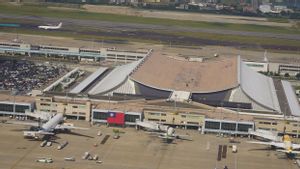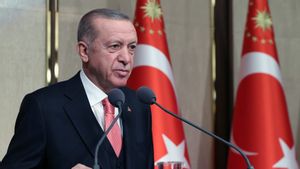JAKARTA - The defense sector has received the largest allocation in the Afghan government's budget this year, in line with the Taliban's plan to increase defense forces and build anti-aircraft missile capacity, said one of the country's senior defense officials.
The defense ambitions of the Taliban, who took power in 2021, have come in the face of strong international criticism of its policies, such as curbing jobs and education for women, which hinder steps towards diplomatic recognition.
In his remarks on Tuesday, Qari Fasihuddin Fitrat, a Taliban commander from the northern Badakhshan region and Commander-in-Chief of the Afghan Armed Forces, condemned foreign drone attacks into his country's airspace.
The defense force, now numbering 150,000, is targeted for an additional 50,000, he said, speaking in his office at the heavily fortified Ministry of Defense in Kabul, the capital, although he did not reveal the exact figure of the fund.
"The Ministry of Defense is top ranking in the budget," he said, adding that it received a much higher amount than other ministries, because it was a priority in the budget, which was mostly funded by increased tax and customs revenues. National News April 13th.
Since their takeover, the Taliban have spent 1-1/2 years building a national civilian and military government, from an insurgent force that fought 20 years against foreign troops and the previous US-backed Government of Afghanistan.
No foreign country officially recognizes the government of the Taliban, who are battling an economic drag following sanctions on the banking sector and cutting off all development aid.
Qari Fasihuddin said the main defense focus was securing Afghanistan's airspace from drones and other attacks.
"Anti-aircraft missiles are a country's need," he said, adding that all nations seek weapons developed to ensure the integrity of their territory and airspace, a problem Afghanistan also faces.
"There's no doubt that Afghanistan is trying, and doing its best, to have it," he said.
But, Qari Fasihuddin declined to elaborate on where the authorities were looking to get the anti-aircraft missiles from.
He also stopped short of mentioning Pakistan, which the Taliban government has frequently protested against, accusing its neighbors of allowing drones into Afghanistan.
“We are doing our best to find solutions for the protection of our airspace. We will work on it to the best of our abilities."
"Where are we going to get the secret, but we have to have it," said Qari Fasihuddin.
Meanwhile, Pakistan's Foreign Ministry did not immediately respond to a request for comment. Pakistani officials have not confirmed whether its airspace is being used for drone access to Afghanistan.
"We have always tried, and will try, to resolve this issue by diplomatic means, and we have done our best to be patient with this case," Qari Fasihuddin said, but remained cautious.
"Neighboring countries should not let our patience run out," he criticized.
另请阅读:
Relations between the two neighbors have been strained at times, as Pakistan accuses the Taliban government of allowing Afghanistan's territory to be used as a safe haven for militant groups.
Among these is the Pakistani Taliban (TTP), which has stepped up attacks inside Pakistan in recent months.
However, the Taliban government denies allowing its territory to be used to attack others.
The English, Chinese, Japanese, Arabic, and French versions are automatically generated by the AI. So there may still be inaccuracies in translating, please always see Indonesian as our main language. (system supported by DigitalSiber.id)


















